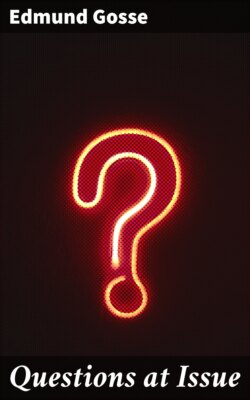Читать книгу Questions at Issue - Edmund Gosse - Страница 5
The Influence of Democracy on Literature
ОглавлениеIt is not desirable to bring the element of party politics into the world of books. But it is difficult to discuss the influence of democracy on literature without borrowing from the Radicals one of the wisest and truest of their watchwords. It is of no use, as they remind us, to be afraid of the people. We have this huge mass of individuals around us, each item in the coagulation struggling to retain and to exercise its liberty; and, while we are perfectly free to like or dislike the condition of things which has produced this phenomenon, to be alarmed, to utter shrieks of fright at it, is to resign all pretension to be listened to. We may believe that the whole concern is going to the dogs, or we may be amusing ourselves by printing Cook's tickets for a monster excursion to Boothia Felix or other provinces of Utopia; to be frightened at it, or to think that we can do any good by scolding it or binding it with chains of tow, is simply silly. It moves, and it carries the Superior Person with it and in it, like a mote of dust.
In considering, therefore, the influence of democracy on literature, it seems worse than useless to exhort or persuade. All that can in any degree be interesting must be to study, without prejudice, the signs of the times, to compare notes about the weather, and cheerfully tap the intellectual barometer. This form of inquiry is rarely attempted in a perfectly open spirit, partly, no doubt, because it is unquestionably one which it is difficult to carry through. It is wonderfully easy to proclaim the advent of a literary Ragnarok, to say that poetry is dead, the novel sunken into its dotage, all good writing obsolete, and the reign of darkness begun. There are writers who do this, and who round off their periods by attributing the whole condition to the democratic spirit, like the sailor in that delightful old piece played at the Strand Theatre, who used to sum up the misfortunes of a lifetime with the recurrent refrain, "It's all on account of Eliza."
The "uncreating words" of these pessimists are dispiriting for the moment, but they mean nothing. Those of the optimist do not mean much either. A little more effort is required to produce his rose-coloured picture, but we are not really persuaded that because the brown marries the blonde all is for the best in the best of all possible worlds. Nor is much gained by prophecy. We have been listening to a gentleman, himself a biographer and an historian, who predicts, with babe-like naïveté, that all literary persons will presently be sent by the democracy to split wood and draw water, except, perhaps, "the historian or biographer." In this universal splitting of wood, some heads, which now think themselves mighty clever, may come to be rather disastrously cracked. It was not Camille Desmoulins whom Fate selected to enter into his own Promised Land of emancipated literature.
We gain little by a comparison of our modern situation with that of the ancient commonwealths. The parallel between the state of literature in our world and that in Athens or Florence is purely academic. Whatever the form of government, literature has always been aristocratic, or at least oligarchic. It has been encouraged or else tolerated; even when it has been independent, its self-congratulations on its independence have shown how temporary that liberty was, and how imminent the relapse into bondage. The peculiar protection given to the arts by enlightened commonwealths surrounded by barbaric tyrannies was often of a most valuable character, but it resembled nothing which can recur in the modern world. The stimulus it gave to the creative temperament was due in great measure to its exclusiveness, to the fact that the world was shut out, and the appeal for sympathy made within a restricted circle. The Republic was a family of highly trained intelligences, barred and bolted against the vast and stupid world outside. Never can this condition be re-established. The essence of democracy is that it knows no narrower bonds than those of the globe, and its success is marked by the destruction of those very ramparts which protected and inspirited the old intellectual free States.
The purest and most elevated form of literature, the rarest and, at its best, the most valuable, is poetry. If it could be shown that the influence of the popular advance in power has been favourable to the growth of great verse, then all the rest might be taken for granted. Unfortunately, there are many circumstances which interfere with our vision, and make it exceedingly difficult to give an opinion on this point. Victor Hugo never questioned that the poetical element was needed, but he had occasional qualms about its being properly demanded.
